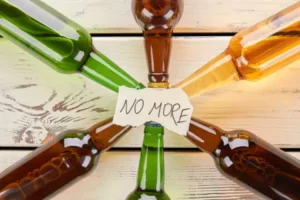
But sometimes addiction isn’t managed properly the first go-round, so slip-ups can happen. She compares it to the treatment of any other type of disease—the first treatment attempted might not work, at which point it might need to be adjusted. “It’s about wondering if there’s something else that needs to be in place to help them stay on track.” The immediate positive effects may not be obvious for a very heavy drinker, as they may experience withdrawal symptoms like shaking, headaches, and nausea. You need to find new hobbies to take the place of things you used to do while drinking. You need to find new activities and people to socialize with if all of your previous social activities revolve around boredom.
- Recovering addicts usually make the mistake of trying to replace their addiction with another habit in a way that can seem compulsive.
- A mental health professional can help you cope with some of the challenges you’ll face on your path to sobriety.
- People in recovery can experience a lot of shame simply for having become addicted in the first place.
- Recovery from AUD is marked by stages of abstinence, withdrawal, repair, and growth.
- Whatever it is, new activities can lead to new friends with interests like yours.
Packing your hurricane go bag? Make provisions for your health
Then there are environmental stressors—factors you may not even realize are affecting you. The more aware you become of the different kinds of stress you face, the better equipped you’ll be to manage them effectively. When we’re repeatedly exposed to pleasure-producing stimuli — social media, sugar, alcohol or any number of readily-available substances — our bodies adjust. Then we need more on repeated use, just to feel a the marginal pleasure boost – and, eventually, just to feel “normal.”
Feel like you should be drinking less? Start here

Once this was no longer an option, I started to write instead. I use writing as my personal therapy when something is troubling me and I need to think. At the very least, you want to get your drinking habits and health under control. In this post, I’ll show you how to stop drinking using simple techniques, being sober around drinkers mindset shifts, and relying on the support systems around you. However, the idea behind the Addicted-Self Model is that alcoholism, like many other diseases, is a physical ailment—one that there is no cure for, only treatments that can help alleviate the symptoms.
Enjoy healthy self-control, a centered enjoyment of life, and inner freedom.
Strictly speaking, sobriety is the state of being sober—not being under the influence of alcohol or drugs. However, the word is often used in different ways in different contexts. Many 12-step programs suggest that sobriety means total abstinence, which means never using the substance again.
Are Your Parents to Blame for Your Addiction?
- This month, many people are giving up alcohol for 31 days in a campaign called Sober for October.
- If you’re ready to make a positive change, here’s what you may want to know about the recovery process.
- Most of the time, extrinsic motivations are what drives a person to look at their relationship with alcohol at first.
- After all, you can’t hang around your drug dealer or old drinking buddies and expect to remain sober for very long.
- But any kind of addiction affects both your body and your mind.
- So, it’s extra helpful to have a support network available to you when you need it.
To avoid relapse and remain sober, it’s important to develop healthy relationships. You may also need to change your route to work or home in order to avoid any triggers, or people, places, or things that make you want to use drugs or drink again. Post-acute withdrawal syndrome (PAWS) involves withdrawal symptoms that persist past the detox period.


Here are 8 benefits I’ve observed from 9 years of sobriety. Fear of loneliness can keep you cutting back or cutting out your drinking. Even if alcohol isn’t enjoyable to you, the socialization ritual surrounding it is.
- Continuing therapy after your treatment allows you to become a better version of yourself and equips you with a stronger desire to stay substance-free.
- The first step to managing stress is understanding the type of stress you’re dealing with.
- And it’s that regulating behavior tied to emotions that’s such an important step even after becoming physically sober.
- The podcast portion of this story was produced by Audrey Nguyen, with engineering support from Kwesi Lee.
- You might think of sobriety as a kind of loss, but it’s actually fueled by a sense of gain.
- I did it, but I wish someone had warned me about the emotional challenges I’d face when I quit drinking.

Enjoy the opportunity to learn about desire by not fulfilling it. Be more realistic about the actual rewards of indulging desires; enjoy waking up from the spells cast – “Drink this! Smoke that! Eat these!” – by addictive hungers. Enjoy how sobriety supports your practices in the upper reaches of human potential, including in spiritual life. You might think of sobriety as a kind of loss, but it’s actually fueled by a sense of gain.
